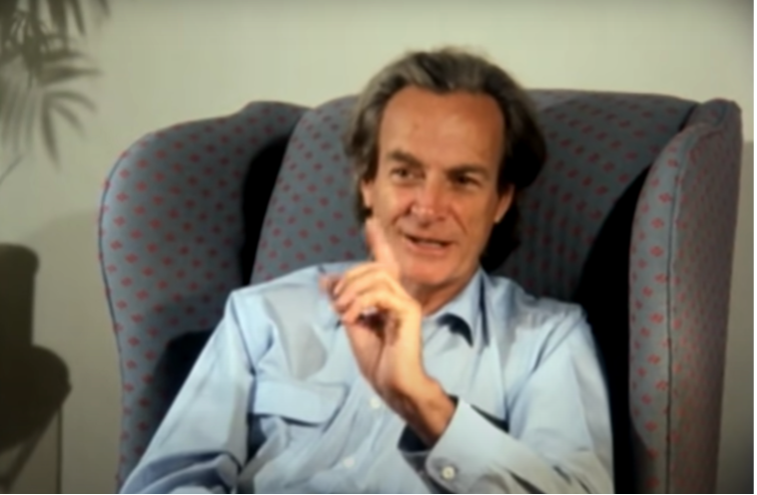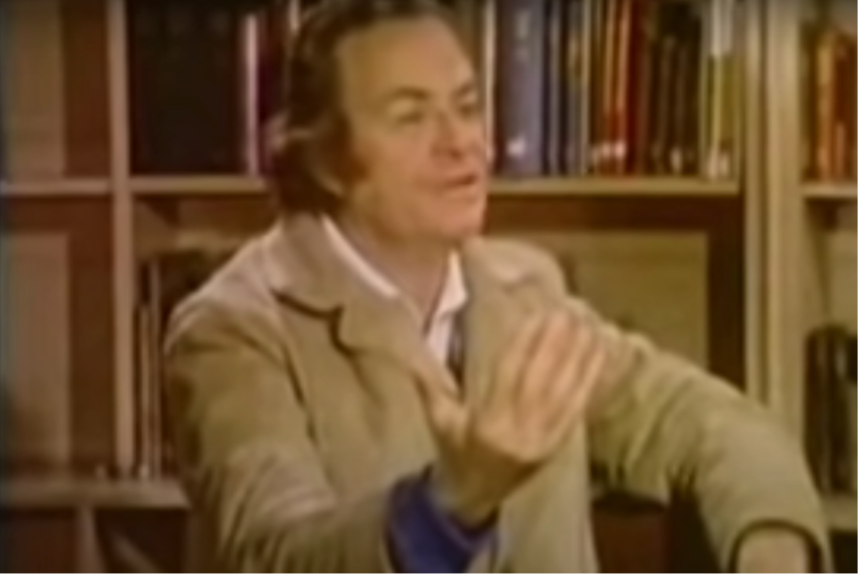Richard Feynman Wants You to Question Your Assumptions
On Tuesday, January 28, 1986, my schoolteacher rolled a cart with a TV on it into our classroom and announced that we would watch the Space Shuttle Challenger launch into orbit. During these late Cold War years, it was a high-profile opportunity for our country to prove its space dominance. Seven astronauts were on board, one of whom was Christa McAuliffe, the first teacher to go to space. I remember the fanfare, the flags, and the reverent voice of the announcers. And then, just 73 seconds into the flight, the Challenger exploded into long arcs of contrail, floating slowly down through endless blue sky. For a long time, no one spoke.

A Presidential Commission investigation ensued. Commission member Richard Feynman, a Nobel-decorated physicist, ignored government protocol and interviewed NASA scientists directly. Once he had understood the problem—the O-rings on the fuel tank had become brittle and failed in cold weather—he came up with an easy way to demonstrate the problem in a way that everyone could understand: On live television, he dipped a piece of the O-ring into ice water and then snapped it with a pair of pliers. “Reality must take precedence over public relations, for Nature cannot be fooled,” he wrote in the commission report.
Startups rarely fail as spectacularly as the Challenger. But founders often tell themselves inaccurate stories like the ones that executives at NASA and rocket contractor Morton Thiokol had comforted themselves with: We already have the answers. We know how this works. But if you want to reach orbit, reality must take precedence.
I often find that assumptions upon which a startup is built are repeated to the point where they become unquestioned intellectual furniture. And that is corrosive to the primary benefit your little startup has over big competitors, which is speed and agility. I’ve been there: I test out some theory about why customers would obviously purchase my product, and the first few people I say that to don’t challenge me. So I start to accept it. Soon, it becomes catechism. At some point, we all breathe our own exhaust.
I recently consulted with a startup that sells non-alcoholic beer. They’d seen enough customers drink their product that they’d come to assume it’s obvious that everyone would want non-alcoholic beer, because people want to live healthier. They also told me they do three-quarters of their sales in Asia. When I challenged them on some of their assumptions—purposely blunt questions like “Why would anyone want to drink non-alcoholic beer?” “If you want to be healthy, why drink any kind of beer, alcoholic or not?” and “What is it about Asian cultures that make your non-alcoholic beer more attractive?” the founder struggled to answer. There is value in addressing unquestioned assumptions.
When my wife teaches Introduction to Photography classes, one of the first things she teaches her students is to change their perspective. Stop taking photos from adult height. Look straight up, or down. Climb on a chair. Lie on the floor. Clichés happen when you stop asking questions and you look at the situation from the same angle as everyone else. Inspiration starts with curiosity.
The other day I was watching some old Feynman interviews—he’s a bit of a hero to me, and patron saint to those who love complex topics explained clearly—and he stopped me cold with an answer to a question about why magnets of the same polarity repel each other. Instead of just diving into the physics, he spoke at length about the unquestioned assumptions upon which answers to Why questions often rest.
He begins his answer with an example of Aunt Minnie slipping on ice, breaking her hip, and going to the hospital. That sounds logical, but imagine you’re from Mars, and don’t know that ice is slippery, or why you go to the hospital when you break your hip. “When you explain a Why, you have to be in some framework that you allow something to be true,” he says. “Otherwise, you’re perpetually asking Why.” If the audience doesn’t understand the assumptions that make up your framework, you’ve lost them in a forest of unanswered Whys. Enjoy his full answer here:

https://youtu.be/P1ww1IXRfTA?t=897
How are you describing why your customers should be interested in your product? Are you making an assumption that may not be obvious to your target audience, or is inaccurate? I’ve read too many marketing materials from startups that assume I have a problem that I don’t have, or don’t understand.
Another question that startups struggle to find their optimal framework for is Why is your startup important? I’ve seen too many companies focus on features rather than addressing the needs that truly motivate and inspire potential customers. Answering Why is the fine art of knowing what you can assume and what you can’t.
There’s another classic Feynman moment that has resonance for entrepreneurs towards the end of the 1973 Feynman interview “Take the World from Another Point of View.” Feynman spends several minutes talking about experts from which other fields he prefers speaking with. He’s worked himself into arguing that he has little in common with those in the humanities and arts when he suddenly stops and says, “I take it all back,” and then describes how he finds a common bond with the truly curious in any field. Someone who “has stretched himself to the end…therefore he’s up against mysteries all the way around the edge, and awe, and we can talk about mystery and awe—that’s what we have in common.”
The whole interview is great. Here’s Part 4, with the “take it all back” moment at 4:17. Enjoy the awesome retro 70s vibe, and ignore if you can the sexism of his male-only formulation:

Channel Feynman’s boundless curiosity, along with his willingness to cast aside whatever he believed a minute earlier if new facts and ideas suggest a better solution. Do the intellectual equivalent of standing on a chair or lying on the floor, and examine your startup, your goals, and your customers from that perspective. Push to reach a place where you’ve gone as far as you can and come up to mystery and awe all the way around. It might change the way you talk about your startup—or maybe even change the way you think about the whole thing, too.
Want more Feynman?
Complete Fun to Imagine https://www.youtube.com/watch?v=P1ww1IXRfTA
Los Alamos from Below: https://www.youtube.com/watch?v=uY-u1qyRM5w
Lecture Highlights: https://www.youtube.com/watch?v=EYPapE-3FRw&list=PLyQSN7X0ro23NUN9RYBP5xdBYoiv2_5y2&index=1
Great bedside reading: https://www.amazon.com/Surely-Feynman-Adventures-Curious-Character/dp/0393316041
